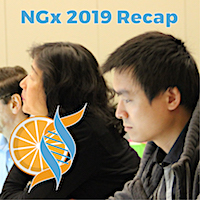Microbiome and Nutrition
The complex community of bacteria, yeasts and viruses living in our intestines, collectively known as the gut microbiome, is shaped, in part, by what we eat. Genetics, environment, and other factors also influence an individual’s microbial community. Research at the NRI investigates these complex relationships and their impact on disease risk. We use animal models and bioinformatics to study the associations between nutritional metabolites, gut microbiome, and health. What happens in the gut doesn’t stay in the gut. Your microbiome can play a role in cardiovascular disease, obesity and diabetes, and even cancer. Our team envisions a future where analysis of your microbiome can determine disease risk, and medical foods can be prescribed to treat and prevent disease by regulating the microbiome.
Publications
Microbiome and Nutrition Publications
2020
Population studies of TMAO and its precursors may help elucidate mechanisms. Meyer K
2019
Association of dietary patterns with the gut microbiota in older, community-dwelling men. Meyer K
2018
Meta-analysis of human genome-microbiome association studies: the MiBioGen consortium initiative. Meyer K
Human microbiota, blood group antigens, and disease. Sumner S
2017
Trimethylamine N-Oxide, the Microbiome, and Heart and Kidney Disease. Zeisel S
2016
Diet and Gut Microbial Function in Metabolic and Cardiovascular Disease Risk. Meyer K
Antibiotic-mediated gut microbiome perturbation accelerates development of type 1 diabetes in mice. Sumner S
Related News
Recap: 2019 Nutrigenetics, Nutrigenomics and Precision Nutrition Short Course
Participants from around the world attended the NRI’s fourth consecutive Nutrigenetics, Nutrigenomics, and Precision Nutrition Short Course from June 3 – 6 in Kannapolis on the North Carolina Research Campus. Known as “NGx,” the 4-day, workshop-style course provides...
Infant Nutrition and Cognition Study
Study Purpose: The purpose of this research study is to determine if eating eggs during breastfeeding will improve nutrient content of milk and infant cognition. Recruiting: Healthy lactating women at 12-15 weeks postpartum What participants will do: You and your...
Infant Nutrition and Cognition Study
Study Purpose:
To show how nutrition helps babies grow and learn.
Recruitment Requirements:
• 18 to 35-year-old women who are pregnant and plan to breastfeed, or breastfeeding babies younger than 3 months
Community Resources
US Post Office Kannapolis Library Kannapolis Parks & Recreation Shopping Oak Avenue Mall – 0.7 miles – within walking distance to NRI 358 Oak Ave Mall Dr, Kannapolis , NC 28081 Contains Grocery (Food Lion), Discount (Family Dollar), and Restaurants (Subway, Pizza...
Housing
Long-term American Homes 4 Rent Atlantic American (Castle & Cooke) Coopers Ridge Apartments Integra Springs Apartments at Kellswater Legacy Grand at Concord Apartments The Ridges Apartments Vida Apartments Inform landlord that you are employed at UNC Chapel Hill...
Medical Facilities
Some notable nearby area hospitals include: Atrium Health-NorthEast Medical Center 920 Church Street N, Concord, NC 28025 704-403-3000 Carolinas Healthcare System Kannapolis 2711 Lane Street, Kannapolis, NC 28081 704-403-3000 Novant Health Presbyterian Medical Center...




